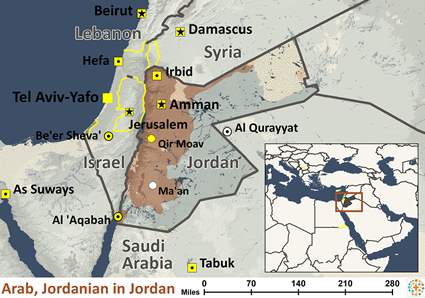Jordanians are among the Levantine Arabs, as reflected by their Arabic dialect. The country of Jordan is mostly covered with desert which can support only a few Bedouin nomads. Thus the majority of its people have settled in the northern highlands, where greater rainfall can support agriculture.
Jordan is at the crossroads of the Middle East and has served to connect Asia, Africa, and Europe as a conduit for trade and communications from ancient times until now.
In 1920, Jordan was established under the name Transjordan as a British mandate, and Abdullah I was made king. Jordan was granted independence from the British in 1946, when the name of the country was officially changed to The Hashemite Kingdom of Jordan.
Jordanian Arabs highly value marriage and child-rearing. The father of the bride usually arranges the marriage. People usually marry their cousin, someone they have had little contact with before the wedding. After the wedding, a woman's place is controlled by her husband. She spends much of her time cleaning, cooking and taking care of children. If there is a divorce, the man has custody of the children. Because of a lack of water and natural resources, Jordanian Arab families are small.
Most Jordanian Arabs live in cities. Their small one or two bedroom apartments are usually made of concrete. Those with wealth have larger apartments with a central courtyard, separated from the outside with high concrete walls. Those in urban areas are often employed in finance, transportation or tourism.
In the villages, their homes are either made from bricks, stones or mud. Rural Jordanian Arabs are usually hospitable and friendly. It is common for them to welcome traveling strangers into their homes. A woman's public presence is more accepted than in other Arab countries. There is so little arable land that few Jordanian Arabs are farmers. They are more likely to work in mines. Potash, phosphate and gypsum are mined. Manufacturing is important; they produce cement and fertilizer. This is a poor country that is dependent on foreign aid. Jordan has a serious trade deficit.
The state religion in Jordan is Islam. The great majority of Jordanian Arabs practice Sunni Islam. Shias living in the eastern half of Jordan make up the remainder. Christians account for a small percentage of the population, but the largest churches are Orthodox, not Evangelical. There are also small Muslim groups who desire to see an extreme Islamic government.
Like members of religious groups all over the world, Jordanian Muslims equate “Christianity” with a worldwide political system. A Muslim who professes faith in Jesus can lose his family, his honor, his job or even his life. A few Jordanian Arabs attending a church service are tolerated, but when the number increases, they run the risk of being questioned by police. This discourages them. Small group meetings also arouse suspicion, but it is far less likely to attract attention than a church building. There is a great need for church planting in rural areas where Islam isn't challenged.
Ask God to protect the small number of evangelical believers in Jordan and help them to grow strong in him.
Pray that Jordanian Arab Christians would be willing to sacrifice their time, and even their lives, to bring the gospel to their Muslim neighbors.
Pray for Jordanian Muslim family leaders to have dreams of the risen Christ that will give them the desire to seek and find Jesus.
Pray for a strong spiritual hunger among Jordanian Arab Muslims.
Scripture Prayers for the Arab, Jordanian in Jordan.
https://en.wikipedia.org/wiki/Jordanian_Arabic
https://en.wikipedia.org/wiki/Christianity_in_Jordan
https://www.everyculture.com/Ja-Ma/Jordan.html
| Profile Source: Joshua Project |


























